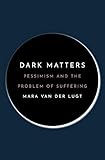Dark Matters : Pessimism and the Problem of Suffering / Mara van der Lugt.
Material type: TextPublisher: Princeton, NJ : Princeton University Press, [2021]Copyright date: ©2021Description: 1 online resource (472 p.)Content type:
TextPublisher: Princeton, NJ : Princeton University Press, [2021]Copyright date: ©2021Description: 1 online resource (472 p.)Content type: - 9780691226156
- Good and evil -- History
- Pessimism
- Suffering
- PHILOSOPHY / Ethics & Moral Philosophy
- A priori and a posteriori
- Ad hominem
- Addiction
- Anecdote
- Anguish
- Anti-imperialism
- Antinatalism
- Antipathy
- Apathy
- Arthur Schopenhauer
- Attributes of God in Christianity
- Better Never to Have Been
- Beyond Good and Evil
- Boredom
- Candide
- Christian mortalism
- Civil service
- Counterintuitive
- Cowardice
- Crisis of faith
- Critique
- Dasein
- David Benatar
- David Hume
- Deism
- Discourses (Meher Baba)
- Divine law
- Eclecticism
- Emanuel Swedenborg
- Equal footing
- Essay
- Ethics in religion
- Evil
- Extortion
- Family resemblance
- Fatalism
- Fideism
- Freud and Philosophy
- Gandhism
- God
- Good and evil
- Hard determinism
- Hard problem of consciousness
- Hedonism
- Holism
- Incest
- Indication (medicine)
- Justification (theology)
- Kantianism
- Logical consequence
- Lutheranism
- Make A Difference
- Manichaeism
- Metempsychosis
- Moral evil
- Moral rationalism
- Moral relativism
- Morality
- Natural disaster
- Natural evil
- Nonviolence
- Nuisance
- Omnibenevolence
- Oppression
- Optimism
- Overreaction
- Pessimism
- Peter Wessel Zapffe
- Philosopher
- Philosophical methodology
- Philosophy
- Possible world
- Pride
- Principle of charity
- Problem of evil
- Profession (religious)
- Psychological pain
- Public speaking
- Pure practical reason
- Radical evil
- Religion
- Scholasticism
- Sedition
- Self-help book
- Seriousness
- Skepticism
- Stoicism
- Suicide
- Søren Kierkegaard
- The Constitution of Man
- The Philosopher
- The Problem of Pain
- Theodicy
- Thought
- Torture
- Trolling (fishing)
- Unless
- Untouchability
- We Are Doomed
- Wickedness
- online - DeGruyter
| Item type | Current library | Call number | URL | Status | Notes | Barcode | |
|---|---|---|---|---|---|---|---|
 eBook
eBook
|
Biblioteca "Angelicum" Pont. Univ. S.Tommaso d'Aquino Nuvola online | online - DeGruyter (Browse shelf(Opens below)) | Online access | Not for loan (Accesso limitato) | Accesso per gli utenti autorizzati / Access for authorized users | (dgr)9780691226156 |
Frontmatter -- Contents -- Introduction Philosophy in a Minor Chord -- Chapter 1 The Complaint: Bayle and Malebranche on Physical Evil -- Chapter 2 The Optics of Optimism: Leibniz and King Respond to Bayle -- Chapter 3 Of Hope and Consolation: Voltaire and the Deists -- Chapter 4 When Stoicism Meets Pessimism: La Mettrie and Maupertuis -- Chapter 5 The Dispositional Problem of Evil: David Hume -- Chapter 6 The Art of Suffering: Jean-Jacques Rousseau -- Chapter 7 The Failure of Theodicy: Immanuel Kant -- Chapter 8 The Flute-Playing Pessimist: Arthur Schopenhauer -- Chapter 9 Dark Matters: Pessimism as a Moral Source -- Acknowledgements -- Bibliography -- Main Primary Sources -- Other Primary Sources -- Secondary and Modern Sources -- Index
restricted access online access with authorization star
http://purl.org/coar/access_right/c_16ec
An intellectual history of the philosophers who grappled with the problem of evil, and the case for why pessimism still holds moral value for us todayIn the seventeenth and eighteenth centuries, philosophers engaged in heated debates on the question of how God could have allowed evil and suffering in a creation that is supposedly good. Dark Matters traces how the competing philosophical traditions of optimism and pessimism arose from early modern debates about the problem of evil, and makes a compelling case for the rediscovery of pessimism as a source for compassion, consolation, and perhaps even hope.Bringing to life one of most vibrant eras in the history of philosophy, Mara van der Lugt discusses legendary figures such as Leibniz, Hume, Voltaire, Rousseau, Kant, and Schopenhauer. She also introduces readers to less familiar names, such as Bayle, King, La Mettrie, and Maupertuis. Van der Lugt describes how the earliest optimists and pessimists were deeply concerned with finding an answer to the question of the value of existence that does justice to the reality of human suffering, but how they were fundamentally divided over what such an answer should look like.A breathtaking work of intellectual history by one of today's leading scholars, Dark Matters reveals how the crucial moral aim of pessimism is to find a way of speaking about suffering that offers consolation and does justice to the fragility of life.
Mode of access: Internet via World Wide Web.
In English.
Description based on online resource; title from PDF title page (publisher's Web site, viewed 01. Dez 2022)


